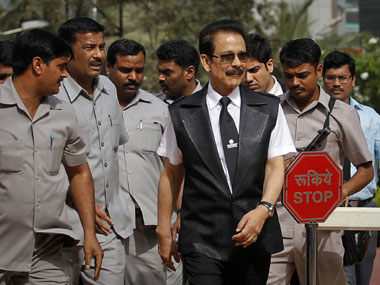The controversial Sahara group appears to be running rings around the Supreme Court. In the process the prestige of the apex court cannot but stand diminished, unless it asserts itself again.
At the last hearing (on Friday, 4 October) in the seemingly endless case involving the fraudulent issue of optionally fully convertible debentures (OFCDs) by two Sahara group companies, the Supreme Court asked market regulator Sebi and the Saharas to settle the case amicably, says The Indian Express. The court used harsh words against the Saharas, but seemed to be willing to give the group more elbow room.
The truth is there is no room to settle. Can Sebi and Sahara “settle” a case that has already been settled in finality by the Supreme Court in an order dated 31 August 2012 , and which the Subrata Roy-led group has been dodging tenaciously? Does the Supreme Court now believe that its order was merely the bugle for the combatants to start haggling about how and whether to settle?
[caption id=“attachment_813433” align=“alignleft” width=“380”]  Sahara Group chairman Subrata Roy. Reuters[/caption]
Let’s be clear: there is nothing to settle bar the Sahara Group’s complete surrender and compliance with the order of the Supreme Court last year.
That verdict (read the full order here), delivered by a two-judge bench comprising Justice KS Radhakrishnan and Justice JS Khehar, the same bench hearing the case now, established several things. Among them:
- Two Sahara companies, Sahara India Real Estate Corporation and Sahara Housing Investment Corporation, had illegally raised humongous amounts of money from the public through OFCDs by calling it private placement.
Impact Shorts
More Shorts- The order also suggested that Sahara’s investors may not all be bona fide. Subsequent efforts by Sebi to get lists of genuine investors have proved the point that a significant number of Sahara's investors did not exist .
- The court ordered the two companies to repay an amount of over Rs 24,000 crore to Sebi within 90 days (i.e. 30 November 2012). The regulator will then distribute the money to bonafide investors after verifying their antecedents.
- To ensure compliance, the Supreme Court asked Justice BN Agarwal, a former Supreme Court judge, to assist Sebi and oversee the implementation of its orders.
Prima facie, the Sahara group stands in open defiance of this Supreme Court order since it has (1) not paid Sebi the amounts mentioned despite extensions; (2) and has claimed that most of the money was repaid - something it did not disclose when the case was being heard. Earlier, the group claimed that it had nearly three crore investors in the OFCDs, but after the judgment came, it said most of the money was repaid in the interim. Could three crore small investors have been repaid in months?
However, can one blame the Saharas when it is the Supreme Court itself that has been giving Subrata Roy and his companies ample leeway to go on delaying compliance?
Consider what has really happened.
#1: The Sahara group has successfully managed to avoid complying with the August 2012 order for nearly 14 months now. Will anyone now think Supreme Court orders cannot be played around with?
#2: Within months of the order, another bench of the Supreme Court, this time headed by the then Chief Justice, Altamas Kabir, formally gave Sahara time till February to comply with the order. But even by the end of February the Sahara group had paid up only Rs 5,120 crore, claiming the rest had been repaid.
#3: At hearings yesterday (4 October), the Supreme Court, this time headed by the same judges who handed down the 31 August 2012 verdict, seemed irritated with the Saharas - but still keen to get Subrata Roy to comply amicably. The court seemed to offer the group a way out by asking if it can provide a bank guarantee for nearly Rs 20,000 crore, but the group was still pushing for Sebi to accept alternate collateral like properties. Sebi declined, and its counsel Arvind Datar emphasised this: “I have been dealing with the group for the past four years. It is not a group playing cricket. Not a single request has been complied with. They claim they have assets worth Rs 60,000 crore now. The dues are only a third,” reports Business Standard.
To be sure, the judges were not amused. According to Business Standard, the court hinted that group officials could be detained till the order of August last year was fully complied with. When Sahara’s counsel suggested that Subrata Roy was not liable to contempt, a testy Justice Khehar suggested that the court would “try to find a way out” and pointed to a 1960 judgment which allowed detention till court orders were complied with.
All this suggests that the Supreme Court is running out of patience with the Saharas. It is probably time for it to show that it means business if the Saharas still don’t sign on the dotted line by 28 October, the date fixed for the next hearing. But one thing is clear: there is nothing to settle. It is upto the court to make this clear with a clear verdict: comply or go to jail.


)

)
)
)
)
)
)
)
)



